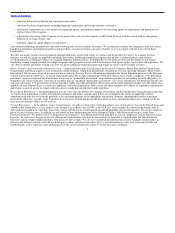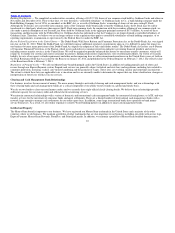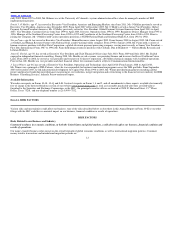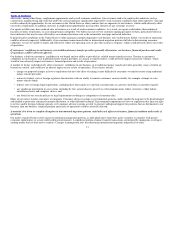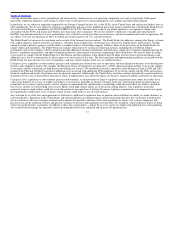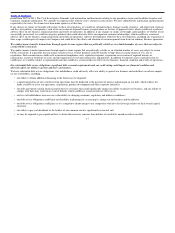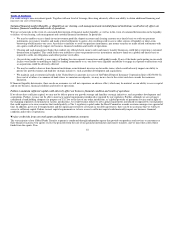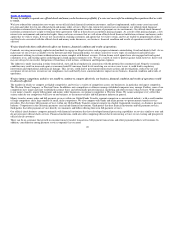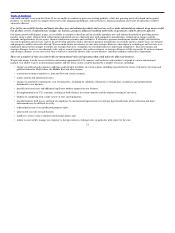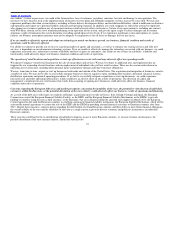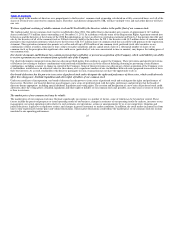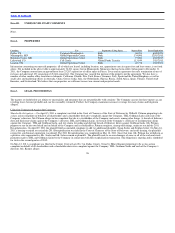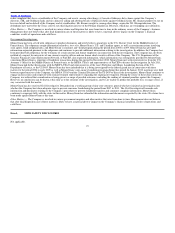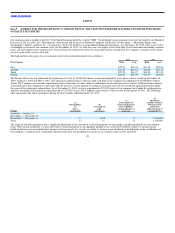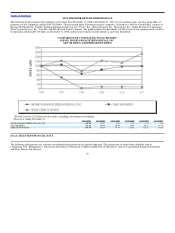MoneyGram 2011 Annual Report Download - page 20
Download and view the complete annual report
Please find page 20 of the 2011 MoneyGram annual report below. You can navigate through the pages in the report by either clicking on the pages listed below, or by using the keyword search tool below to find specific information within the annual report.
Table of Contents
agent becomes insolvent, files for bankruptcy, commits fraud or otherwise fails to remit money order or money transfer proceeds to us, we must nonetheless
pay the money order or complete the money transfer on behalf of the consumer.
Moreover, we have made, and may make in the future, secured or unsecured loans to retail agents under limited circumstances or allow agents to retain our
funds for a period of time before remitting them to us. As of December 31, 2011, we had credit exposure to our agents of approximately $352.0 million in
the aggregate spread across 12,000 agents, of which four owed us in excess of $15.0 million.
Our official checks outsourcing business is conducted through financial institutions. Our financial institution customers issue official checks and money
orders and remit to us the face amounts of those instruments the day after they are issued. We are liable for payment on all of those instruments except
cashier’s checks. As of December 31, 2011, we had credit exposure to our official check financial institution customers of approximately $350.8 million in
the aggregate spread across 1,300 financial institutions, of which one owed us in excess of $15.0 million.
We monitor the creditworthiness of our agents and financial institution customers on an ongoing basis. There can be no assurance that the models and
approaches we use to assess and monitor the creditworthiness of our agents and financial institution customers will be sufficiently predictive, and we may
be unable to detect and take steps to timely mitigate an increased credit risk.
In the event of an agent bankruptcy, we would generally be in the position of creditor, possibly with limited security or financial guarantees of performance,
and we would therefore be at risk of a reduced recovery. We are not insured against credit losses, except in circumstances of agent theft or fraud. Significant
credit losses could have a material adverse effect on our business, financial condition and results of operations.
An inability by us or our agents to maintain adequate banking relationships may adversely affect our business, financial condition and results of
operations.
We rely on domestic and international banks for international cash management, ACH and wire transfer services to pay money transfers and settle with our
agents. We also rely on domestic banks to provide clearing, processing and settlement functions for our paper−based instruments, including official checks
and money orders. Our relationships with these banks are a critical component of our ability to conduct our official check, money order and money transfer
businesses. An inability on our part to maintain existing or establish new banking relationships sufficient to enable us to conduct our official check, money
order and money transfer businesses could adversely affect our business, financial condition and results of operations. There can be no assurance that we
will be able to establish and maintain adequate banking relationships.
If we cannot maintain a sufficient relationship with a limited number of large international banks that provide these services, we would be required to
establish a global network of banks to provide us with these services. Utilizing a global network of banks could alter the pattern of settlement with our
agents and result in our agent receivables and agent payables being outstanding for longer periods than the current remittance schedule, potentially
adversely impacting our cash flow. Maintaining a global network of banks may also increase our overall costs for banking services.
We and our agents are considered Money Service Businesses in the United States under the Bank Secrecy Act. U.S. regulators are increasingly taking the
position that Money Service Businesses, as a class, are high risk businesses. In addition, the creation of anti−money laundering laws has created concern and
awareness among banks of the negative implications of aiding and abetting money laundering activity. As a result, certain of our agents have been denied
access to retail banking services in certain markets regardless of the mitigating factors and controls in place to prevent anti−money laundering law
violations. If our agents are unable to obtain sufficient banking relationships, they may not be able to offer our services, which could adversely affect our
business, financial condition and results of operations.
19


